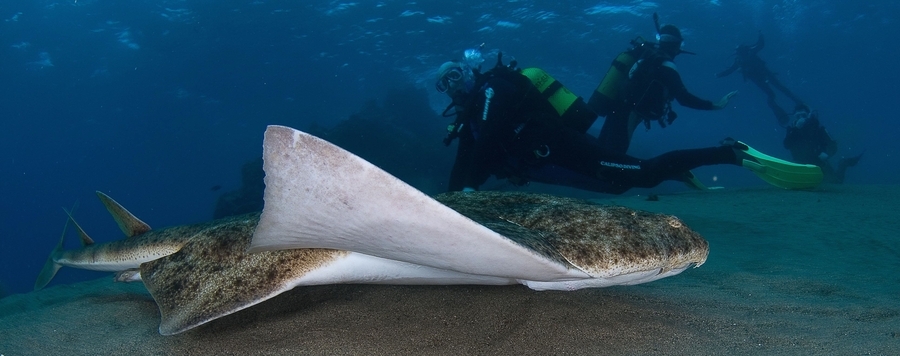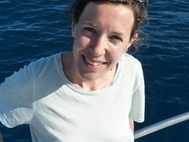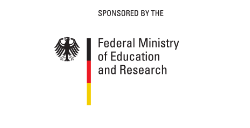However, there is still hope to save these angels. The Angel Shark Project, a collaboration between the Zoological Research Museum Alexander Koenig (ZFMK), the University of Las Palmas de Gran Canaria (ULPGC) and the Zoological Society of London (ZSL) have published the first-ever study to identify the distribution patterns, habitat use and population structure of the Critically Endangered Angelshark (Squatina squatina) in its last stronghold: the waters around the Canary Islands.
Eva Meyers (ZFMK) who led the study explains why this information is important. “Understanding the timing of key events and the places where these sharks spend most of their time to find food, pup or mate, are critical to ensure that conservation strategies are implemented effectively. Our results highlight key aggregation areas, in particular in shallow coastal areas that should be included in spatial management plans.”
Diving with this unique shark is an extremely popular tourist attraction in the Canaries. In 2014, a citizen science programme was initiated by the Angel Shark Project, to collect data from recreational scuba divers with the aim of better understanding Angelshark distribution and ecology – insights which have fed into this study.
“Involving scuba divers has shown to be a very effective tool to obtain large data sets over a wide geographical area in very short time. Diver knowledge and participation has significantly contributed to this study and has also raised awareness of the status of this endangered shark”, says Eva Meyers.
Dr. David Jimenez, ULPGC, adds: “The wider status of Angelsharks was not known for a long time in the Canary Islands, as this species is still seen here relatively frequently. Through collaborative research and conservation, this is one part of a wider programme of work to understand and care for this emblematic shark.”
The information from this study has recently contributed to the development of an Angelshark Action Plan for the Canary Islands.
“Our Vision of the Action Plan is that Angelsharks in the Canary Islands are abundant and protected in their unique stronghold. The data provided by this study will prove invaluable in moving our collaborative project towards this ambition, whilst also informing similar efforts to conserve other remnant Angelshark populations elsewhere in their natural range. It’s a bold ambition given the species’ current Critically Endangered status but, working in partnership and underpinned by scientific research, one we are determined to achieve.” adds Joanna Barker, ZSL.
To report Angelshark sightings, or learn more about the conservation of this species, visit www.angelsharkproject.com.
Notes to Editors
Media Contacts:
Germany: S.Heine [at] zfmk.de 0049 228 9122215
UK: holly.bestley [at] zsl.org 0044 207 449 6288
Spain and Canary Islands: comunicacion [at] ulpgc.es 0034 928-45 10 35 / 0034 928-45 10 28
High resolution images: available upon request S.Heine [at] zfmk.de
Journal Reference
Meyers EKM, Tuya F, Barker J, Jiménez-Alvarado D, Castro-Hernández JJ, Haroun R, Rödder D. Population structure, distribution and habitat use of the Critically Endangered Angelshark, Squatina squatina, in the Canary Islands. Aquatic Conserv: Mar Freshw Ecosyst. 2017. https://doi.org/10.1002/aqc.2769
Zoological Research Museum Alexander Koenig - Leibniz Institute for Animal Biodiversity
(ZMFK)
Zoological Research Museum Alexander Koenig - Leibniz Institute for Animal Biodiversity, Foundation under public law, (ZFMK) is one of the largest natural history research museums in Germany. The museum has earned its reputation as a leader in the documentation, research, and interpretation of biodiversity. bonn.leibniz-lib.de
Universidad de Las Palmas de Gran Canaria (ULPGC)
The Universidad de Las Palmas de Gran Canaria (ULPGC) is one of the leading Spanish universities and is a leader in the use of new technologies and research related to marine and maritime areas. It is comprised of 153 research groups covering all fields of knowledge. www.ulpgc.es
Zoological Society of London (ZSL)
Founded in 1826, ZSL (Zoological Society of London) is an international scientific, conservation and educational charity whose mission is to promote and achieve the worldwide conservation of animals and their habitats. Our mission is realised through our ground-breaking science, our active conservation projects in more than 50 countries and our two Zoos, ZSL London Zoo and ZSL Whipsnade Zoo. For more information visit www.zsl.org







